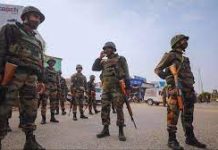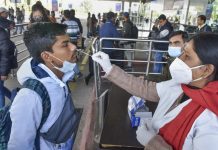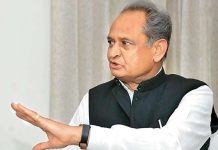 Many ask in New Delhi, why China is in a hurry in Nepal to tie-up a defense deal? What will happen to its new $400 billion agreement with Iran for a 25-year crude oil supply, will it pursue the policy of promoting the new Muslim block of Turkey-Malaysia-Pakistan, whether Russia would finally accept its offer of huge trade deal of purchasing Siberian gas? Few may attempt to answer these loaded issues that too amidst the never-ending death trail of Covid-19 caused by a man-made virus developed in China. During the first six months of its world-wide spread this year, the Chinese president, Li Jinping, adopted a very aggressive posture, but it appears to be increasingly difficult for him to maintain his policy of confrontation, if not belligerent. There is worldwide apprehension that the year-long spell of the Corona Virus of 2020 and its never-ending trail of death will now spilling over to the New Year.
Many ask in New Delhi, why China is in a hurry in Nepal to tie-up a defense deal? What will happen to its new $400 billion agreement with Iran for a 25-year crude oil supply, will it pursue the policy of promoting the new Muslim block of Turkey-Malaysia-Pakistan, whether Russia would finally accept its offer of huge trade deal of purchasing Siberian gas? Few may attempt to answer these loaded issues that too amidst the never-ending death trail of Covid-19 caused by a man-made virus developed in China. During the first six months of its world-wide spread this year, the Chinese president, Li Jinping, adopted a very aggressive posture, but it appears to be increasingly difficult for him to maintain his policy of confrontation, if not belligerent. There is worldwide apprehension that the year-long spell of the Corona Virus of 2020 and its never-ending trail of death will now spilling over to the New Year.
The Chinese president, Li Jinping, and his cronies in the People’s Liberation Army (PLA) may try to convince the common people may claim that he has successfully thwarted any meaningful enquiry of western world into the leak of the virus from its Wuhan facility, and finally annexed Hong Kong to the mainland ignoring their protests. However, he may soon realize that his polices have compromised China’s long-term goals of winning people to its side.
The credibility of China further suffered, when he violated the solemn promise of his predecessor, Deng Xiaoping, to allow Hong Kong and Macau to retain their own economic and administrative systems and the communist system of the mainland China would not be imposed upon them. Under this assurance, each of the two regions would be allowed to continue to have its own governmental system, legal, economic and financial affairs, including trade relations with foreign countries. Deng’s proposal was extended to Taiwan too, but Li Jinping has not only reversed this policy, he increased Chinese hostility towards the island nation.
It may be noted that Deng’s assurances have transformed the Chinese economy. It successfully attracted capital and technologies of the western world making it a formidable economic power. During the past two decades, since the tenure of the President Bill Clinton, who had helped China to join the World Trade Organization, successive US administrations had been helping China. Li Jinping’s decision violating the promises of his predecessors might prove counter-productive for his country’s long-term policies.
It has forced India, Japan and Australia to form strategic alliance with USA, the QUAD. Interestingly, there was no need for QUAD, if China genuinely wanted to promote trade and economic development in the region instead of pursuing the policy of an expansionist power.
India’s reluctance to join the 15-nation Regional Comprehensive Economic Partnership (RCEP) could be traced to the belligerence of China. Japan, Australia and South Korea are signatories to this proposed common market of the region, but it may not be as successful as being claimed. The Chinese strategy is of engaging in an unnecessary confrontation with India, meddling into the affairs of the Muslim world, and support to the Islamic Jihadis of Pakistan in United Nations is expected to face resistance in the coming year.
The Russian experienced this Chinese policy, when it tried to broker peace between India and China following the Galwan standoff on the Tibet- India border. It was quite difficult for the Russians to calm-down the Chinese Defense Minister Gen. Wei Fenghe during the negotiations with his Indian counterpart, Rajnath Singh in Moscow, where the process of disengaging troops was being negotiated. The Russians also are apprehensive that despite the Sino-Russian Treaty of Friendship of 2001 that China may reclaim its strategic city of Vladivostok. During 2020, the Chinese journalists and diplomats in social media have been aggressively campaigning for annexing Vladivostok, which they claim was a part of the Qing dynasty. About a half-a-century ago, in 1969, they had fought for more than six months near Vladivostok leading to heavy casualties.
Under the shadow of the pandemic, new alliances are being shaped in the middle-east. In a bid to counter the new Muslim block, Israeli Prime Minister Netanyahu accompanied by the chief of Mossad, Israel’s intelligence agency, and the US Secretary of State Pompeo visits Saudi Arab. It is expected to end the much prolonged Palestinian issue. It is expected that Pakistan too may soon recognize Israel like UAE though much against the wishes of Turkey and China. The Biden administration is likely to endorse this decision of the Trump’s administration; however, it may reverse Trump’s policy of sanctions against Iran. In either case, it does not serve the Chinese efforts to play a major role in the region, which meets its energy needs.
Super power status
The Chinese belligerence during 2020 and its refusal to cooperate in tackling this deadly pandemic, suspected to be a deliberate leak from its Wuhan facility in the mainland China, has made the world scared of the possible use of a “biological weapon”. The Biden administration may not adopt a confrontational approach towards China, yearning to be a super power, but it may devise effective regulations for preventing Chinese intrusions in the US systems.
The Chinese leadership may be unaware of the new team being heralded in the higher echelons of the new US administration. It would be much difficult for them to manage or manipulate USA’s democratically-run institutions. Maybe, it could be the reason for the Chinese reluctance to greet the president –elect Joe Biden. The Russian policy to await the final outcome of the counting to send its greeting message to Biden, however, could be due to the apprehension that the alleged dirty role of its proxies during the 2016 presidential election could be further enquired and exposed.
Meanwhile, amidst the political changes in Washington, China has embarked upon a full-throttled diplomatic offensive to consolidate its recent gains. In this context, the visits of two high-ranking ministers of China’s Defense Minister Gen. Wei Fenghe and Foreign Minister, Wang Yi to Nepal and Japan respectively could a part of the new diplomatic offensive. Within the ruling hierarchy, Wei Fenghe, occupies much higher position in China than Wang Yi, but his 10-hour visit to the Himalayan nation appears to be without much gain. He offered also liberal funding for improving Nepal’s infrastructure and modern weapons to its armed forces, but the Nepalese response reportedly was not warm as expected. Wei Fenghe could only meet the three dignitaries in Kathmandu, the president, the prime minister and the army chief. He also postponed his scheduled to visit to Bangladesh and Pakistan.
Similarly, Wang Yi’s meeting with the Japanese leaders was not much encouraging gig. He neither could he get a firm assurance that Japan would not reduce its investment in China nor an invite for his boss, president, Li Jinping, keen to visit Japan. His meeting with the Japanese Prime Minister, Yoshihide Suga, and his Foreign Minister, Toshimitsu Motegi were reportedly just courtesy calls. Both sides maintained their respective claims on the territorial disputes, especially about the Senkaku islands, Chinese call it Diaoyutai.
The Chinese are closely watching Indian diplomatic initiatives in the region. It is likely that India may regain its role in the Iranian port Chabahar, her growing ties with the Arab world and renewed efforts to win back Nepal from the Chinese influence. Wei Fenghe’s sudden visit to Nepal was just a follow-up of the Indian army chief, General MM Naravane’s three-day visit to Kathmandu.
The games being played in the international politics during the year 2020 is often compared with the popular cricket tournaments, twenty-20 matches, which are generally one-day matches, but the year 2020 will be remembered as a year, which has faced transformed the world politics. It is expected that world scenario might become much clearer in the coming weeks, especially in the early weeks of 2021.
letters@tehelka.com












